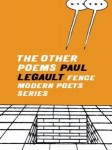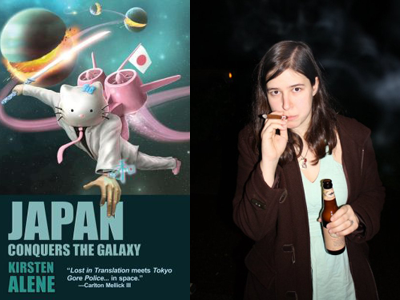


Paul Legault is the author of The Madeleine Poems (Omnidawn 2010) and most recently The Emily Dickinson Reader (McSweeney’s 2012) and co-founder / co-editor of Telephone Books, an all-translation press. This interview focuses on his second book, The Other Poems (Fence 2011).
Monkeybicycle: The Other Poems is a collection of seventy-five sonnets, each of which consists of an opening couplet, four lines of dialogue from various points of view, and then four more closing couplets. Where did this structure come from, what inspired it, and were there any difficulties in creating an entire collection of poems using this approach?
Paul Legault: In one form or another,
it makes sense to use one.
STRUCTURE: I was attempting to imitate myself.
REPETITION: So I did what I did again.
FORM: Which made a form.
THE ORIGINAL: Even though I didn’t have one
that could be noticed
at first. I copied myself.
Then I copied that.
THE OTHER POEMS: I was more than seventy-five of me.
PAUL: I picked my favorites.
BOOK: So that they made a book
inspired by things my friends said
and stuff I thought.
Mb: In the dialogic sections of each poem in particular, there seems a focus on contradiction, many of the voices asking questions that aren’t really questions but in fact statements of opposition or anxiety about shortcomings. Such as in “Missing You”:
CHRISTINE: Oh. Hi there.
WAYNE: He reminds me of West Virginia.
WEST VIRGINIA: He reminds me of you, Wayne.
THE WINGS: I wish wings had thumbs.
Where does this attention to antithesis come from – this anxiety in conversation – and what is its intention within The Other Poems?
PL: In that passage, all the characters
are responding to the arrival of
a limbless, dogheaded angel.
DOG-ANGEL: I inspire divergent responses.
EVERYTHING: Everything does.
YES: It’s less contradiction that I’m interested in and more…
NO: The fact that
contradicting statements can be true
and are that simultaneously
as they should be.
THIS ATTENTION TO ANTITHESIS: I come from an enjoyment of doubling things.
THIS ANXIETY IN CONVERSATION: I come from conversation.
HYPOTHETICAL QUESTION: Isn’t that what conversation is?
Hypothetically,
you don’t actually have to answer that question.
Mb: Using this format of playscript-like dialogue makes for another level of repetition too, with many of the voices repeating their own names or meanings within the conversation. How important is this repetition in terms of the pacing of each piece, and the collection as a whole?
PL: Of repetition, there is no end
of repetition.
PAUL: Paul enjoys speaking in other things’ voices.
THINGS: Because I like it when things talk about themselves.
VOICE: It allows me to say something about them.
ME: By getting them to do it for me.
It’s more about how that’s
my experience of the world
in which everything
is telling me that it exists
EVERYTHING: Or seems to present the argument
that sometimes…
AN IDEA: An idea can have an idea…
SPEECH: And say that — all the while
this dialogue being something
I wrote, told back to me.
Mb: What relationship do The Other Poems have to the previous The Madeleine Poems?
PL: Inasmuch as The Madeleine Poems was written,
it came first.
THE OTHER POEMS: I’m her sister.
MADELEINE: I cannot be portrayed.
THE OTHER: Like me.
“MADELEINE AS JAMES DEAN AND THE WHALE”: This is the title of a poem
from The Madeleine Poems
that employs dialogue
that was the last Madeleine Poem
that I wrote.
CHRONOLOGY: I am what things make
when they follow each other.
THE 1ST BOOK: I want to follow myself.
THE 2ND BOOK: I will always be
made in Brooklyn in a time,
that is not Virginia, in another time.
Mb: You also have a new book out: The Emily Dickinson Reader: An English-to-English Translation of Emily Dickinson’s Complete Poems (McSweeney’s, Aug. 2012). Can you talk to us a little about this new release?
PL: In The Emily Dickinson Reader,
I translated all of Emily Dickinson’s poems
into English.
R.W. FRANKLIN: She wrote 1789 of them.
T.W. HIGGINSON: “When one thinks of a bird, one fancies a soft, swift thing,
full of nervous energy and arrowy motions, —
a song with wings. So remote from ours
their mode of existence,
they seem accidental exiles from an unknown globe,
banished where none can understand their language.”
ENGLISH: You can say the same thing differently.
EMILY DICKINSON: What I wrote
still exists
no matter
what’s done to it.
EXAMPLE: Hope is a thing with feathers.
TRANSLATION: Hope is kind of like birds
in that I don’t have any.
FORM: Form drove the book
like it did The Other Poems
until it was done doing that.
Purchase a copy of The Other Poems here, & read more from / about Paul Legault here.
J. A. Tyler is the author of nine novel(la)s of poetic fiction. His work has been published in Black Warrior Review, Redivider, Cream City Review, Diagram, Fairy Tale Review, Columbia Poetry Review, and New York Tyrant. He also runs Mud Luscious Press.




